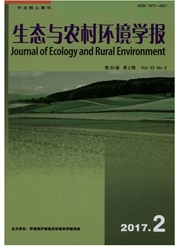

 中文摘要:
中文摘要:
基于浙江省67个县的农村生活污水处理设施的问卷调查结果,统计分析浙江农村生活污水处理设施现状,包括动力情况、处理工艺、执行标准、运维模式、经费来源等,并探讨分析了农村生活污水处理设施排放标准及运维管理的长效性。结果表明:目前浙江农村生活污水处理设施以中小规模(30-60 t·d^-1)为主,约80%的设施采用了无动力厌氧+人工湿地处理技术,出水一般执行GB 18918—2002《城镇污水处理厂污染物排放标准》中的一级B标准,以村镇自管的运维模式为主,年均运维成本为1.3万元·座^-1。从省级管理层面应加快制订符合浙江省情的农村生活污水处理设施排放标准,其指标项目数量不宜过多,指标限值可略宽于GB 18918—2002中的一级A标准;并应尽快形成针对责任主体、资金保障、第三方运维的农村生活污水处理设施长效管理机制。
 英文摘要:
英文摘要:
A survey of the situation of the rural sewage treatment plants( RSTP) in 67 counties of Zhejiang Province was conducted by means of questionnaire,and then statistical analysis was performed for status quo of the facilities,covering power,treatment technology,standard to observe,operation mode and source of funds,etc.. Besides,exploration and analysis was done of standards for discharge of treated sewage from the plants and long-term nature of the operation,maintenance and management of RSTP. Results show that currently,the RSTP in Zhejiang Province are dominantly medium and small in scale( 30- 60 t·d^- 1),and about 80% of the RSTP adopt the technology of unpowered anaerobic artificial wetland and observe Grade B criteria of the standard for sewage discharge( GB 18918- 2002); the plants are generally run and maintained by their respective home villages or townships at an average cost of nearly RMB 13 000 Yuan·a^- 1. It is,therefore,suggested that Zhejiang Province formulate province-specific standards for discharge of treated waste water from RSTP as soon as possible with a proper number of indexes,which may be a little bit looser than Grade A criteria of the standard GB 18918- 2002 and mechanisms of long-term nature for defining responsible parties,funding and managing third-party-run RSTP in Zhejiang Province as soon as possible,too.
 同期刊论文项目
同期刊论文项目
 同项目期刊论文
同项目期刊论文
 期刊信息
期刊信息
